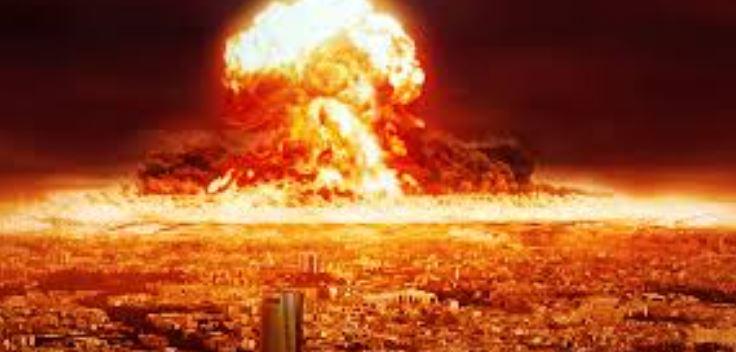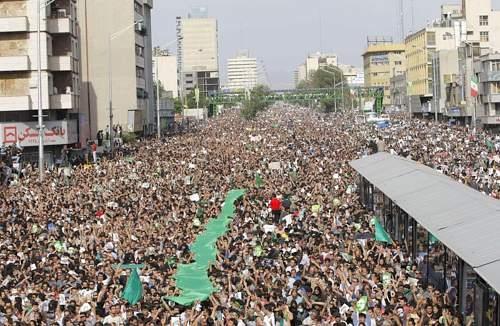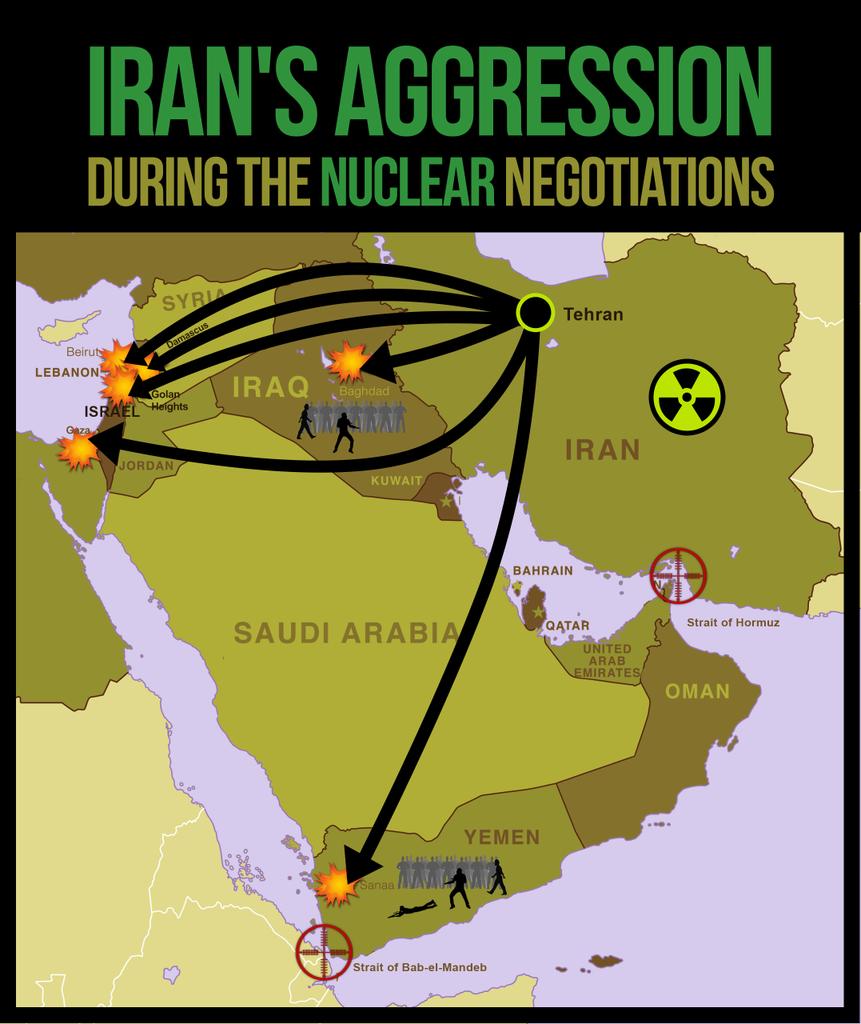This is an astonishingly good Iran deal
Updated by
Max Fisher on April 2, 2015, 8:48 p.m.
http://www.vox.com/2015/4/2/8337347/iran-deal-good
EU foreign policy chief Federica Mogherini and Iranian Foreign Minister Mohammad Javad Zarif on the announcement of a framework deal EU Council/Pool/Anadolu Agency/Getty Images
When Aaron Stein was studying nuclear non-proliferation at Middlebury University's Monterey graduate program, the students would sometimes construct what they thought would be the best possible nuclear inspection and monitoring regimes.
Years later, Stein is now a Middle East and nuclear proliferation expert with the Royal United Services Institute. And he says that the Iran nuclear framework agreement, announced on Thursday, look an awful lot like those ideal hypotheticals he'd put together in grad school.
"When I was doing my non-proliferation training at Monterey, this is the type of inspection regime that we would dream up in our heads," he said. "We would hope that this would be the way to actually verify all enrichment programs, but thought that would never be feasible."
"If these are the parameters by which the [final agreement] will be signed, then this is an excellent deal," Stein concluded.
The framework nuclear deal establishes only the very basics; negotiators will continue to meet to try to turn them into a complete, detailed agreement by the end of June
. Still, the terms in the framework, unveiled to the world after a series of late- and all-night sessions, are remarkably detailed, and almost astoundingly favorable to the United States.
Like many observers, I doubted in recent months that Iran and world powers would ever reach this stage; the setbacks and delays had simply been too many. Now, here we are, and the terms are far better than expected. There are a number of details left to be worked out, including one very big unresolved issue that could potentially sink everything. This is not over.
But if this framework does indeed become a full nuclear deal in July, it would be a huge success and a great deal.
Iran gives up the bulk of its nuclear program in these terms
The framework deal requires Iran to surrender some crucial components of its nuclear program, in part or even in whole. Here are the highlights:
- Iran will give up about 14,000 of its 20,000 centrifuges
- Iran will give up all but its most rudimentary, outdated centrifuges: its first-generation IR-1s, knock-offs of 1970s European models, are all it gets to keep. It will not be allowed to build or develop newer models.
- Iran will give up 97 percent of its enriched uranium: it will hold on to only 300 kilograms of its 10,000 kilogram stockpile in its current form.
- Iran will destroy or export the core of its plutonium plant at Arak, and replace it with a new core than cannot produce weapons-grade plutonium. It will ship out all spent nuclear fuel.
Iran would simply not have much of its nuclear program left after all this.
A shorthand that people sometimes use to evaluate the size of Iran's nuclear program is its "breakout time." If Supreme Leader Ayatollah Ali Khamenei woke up tomorrow morning and decided to kick out all of the inspectors and set his entire nuclear program toward building a nuclear warhead — to "break out" to a bomb — right now it would take him two or three months. Under the terms of the framework, his program would be so much smaller that it would take him an entire year to build a single nuclear warhead.
These terms are not
abject surrender. Iran is allowed to keep a small nuclear program, and it won some concessions of its own. For example, what little uranium enrichment is allowed will be done at Iran's facility at Natanz — a hardened, reinforced-concrete structure that was once used for covert enrichment and that the US had hoped to close.
Iran will also be allowed to do some research at another hardened facility the US had wanted to close, at Fordow, though the research is restricted and will be barred from using fissile material. These are not big concessions, and they matter mostly for their symbolic value, but it's something.
Still, when you look at many of the specifics laid out in the framework, the hard numbers and timetables and the detailed proscriptions, those all tend to be quite favorable to the United States.
The core issue that the framework really nails
Even though the agreement is only a framework, the summary released on Thursday goes into striking detail on an issue that was always going to be among the most crucial: inspections.
Whatever number of centrifuges Iran has or doesn't have, whatever amount of uranium it's allowed to keep or forced to give up, none of it matters unless inspectors have enough authority to hold Tehran to its end of the deal — and to convince the Iranians that they could never get away with cheating. To say that the US got favorable terms here would be quite an understatement; the Iranians, when it comes to inspections, practically gave away the farm.
"I would give it an A," Stein said of the framework. When I asked why: "Because of the inspections and transparency."
There are two reasons that inspections are so important. The first is that super-stringent inspections are a deterrent: if the Iranians know that any deviation is going to be quickly caught, they have much less incentive to try to cheat, and much more incentive to uphold their side of the deal.
The second is that, if Iran were to try a build a nuclear weapon now, it likely wouldn't use the material that's already known to the world and being monitored. Rather, the Iranians would secretly manufacture some off-the-books centrifuges, secretly mine some off-the-books uranium, and squirrel it all away to a new, secret underground facility somewhere. That would be the only way for Iran to build up enough of an arsenal such that, by the time the world found out, it would be too late to do anything about it.
Really robust inspections would be the best way stop that from happening. They would prevent Iran from sneaking off centrifuges or siphoning away uranium that could be used to build an off-the-grid nuclear weapons program, without the world finding out.
The inspections issue has not gotten much political attention. When I
spoke to Jeffrey Lewis, the director of the East Asia Nonproliferation Program at Middlebury's Monterey Institute of International Studies, on Tuesday before the framework was announced, he seemed worried that negotiators would not focus on it much. Rather, overwhelming political focus in Washington and Tehran on issues like Iran's number of allowed centrifuges seemed likely to push inspections from the top priorities.
Lewis suggested that a top item on his wish-list would be inspections so robust that inspectors don't just get to visit enrichment sites like Natanz and Fordow, but also centrifuge factories. That, he said, "would be a big achievement."
Sure enough, come Thursday, Lewis got his wish, and then some: centrifuge factory inspections is one of the terms in the framework, and it's pretty robust. For the next
20 years, inspectors would have "continuous surveillance at Iran's centrifuge rotors and bellows production and storage facilities."
"I was shocked to read that they got them to agree to let us walk around their centrifuge production facilities. That's amazing," Stein said.
It's not just centrifuge factories. Inspectors will have access to all parts of Iran's nuclear supply chain, including its uranium mines and the mills where it processes uranium ore. Inspectors will also not just monitor but be required to pre-approve all sales to Iran of nuclear-related equipment. This provision also applies to something called "dual-use" materials, which means any equipment that
could be used toward a nuclear program.
"The inspections and transparency on the rotors, and the bellows, and the uranium mines is more than I ever thought would be in this agreement," Stein added.
Other favorable items buried in the terms
Stein pointed out two details in the framework that I'd missed, both of which appeared to be pretty significant concessions by the Iranians.
First, Iran has finally agreed to comply by a rule known as Modified Code 3.1 of the Subsidiary Arrangements General Part to Iran's Safeguards Agreement, shorthanded as Modified Code 3.1. It says that Iran has to notify inspectors immediately on its decision to build any new facility where it plans to do nuclear work — long before construction starts.
Iran in the past has either
rejected this rule or stated that it would only notify inspectors a few months before introducing nuclear material at a facility — a "cover your ass" move in case the world caught them building a new nuclear site. Tehran's promise to comply may signal that it intends to stop building such covert facilities.
Second, Stein reads the framework as including Iran's ballistic missile program — something that critics of the deal warned would be left out. Indeed, even many supporters of the negotiations have said that it would be unlikely that American negotiators could get the deal to cover ballistic missiles or other conventional weapons programs; it would simply be asking for too much in one agreement.
"It looks like they were able to expand the scope beyond just nuclear issues," Stein said. He pointed to a line in the sectionthat explains that the UN Security Council would replace its old resolutions imposing sanctions on the nuclear program with a new resolution that incorporated the finalized deal.
The line reads, "Important restrictions on conventional arms and ballistic missiles, as well as provisions that allow for related cargo inspections and asset freezes, will also be incorporated by this new resolution."
"The way I read that is that they address the ballistic missile issue, that that will remain in the new UN Security Council resolution," Stein said. "So you're going to keep the restrictions on ballistic missiles that are already present."
The giant gaping hole in the framework terms
Still, this is just a framework deal on the basic terms; it covers a lot, but not everything. And there is one really important topic that is referenced only vaguely: how and when the world will lift its economic sanctions on Iran.
This has been a major sticking point throughout negotiations. Iran demands that all sanctions be lifted right away; their country needs a functioning economy, they say, and if they're complying with all of the restrictions as of day-one then they shouldn't have to endure crippling sanctions on day-two. But the US and others worry, with good reason, that if they lift all sanctions immediately then Iran will have far less incentive to follow through on its commitments, as it would be very difficult to re-impose those sanctions. And Iran has cheated on such agreements before.
This is a really difficult issue; each side has to trust, to some degree, that the other side will uphold its end of the deal. And someone has to go first. After decades of enmity, that's hard.
The terms in the framework do not come near solving this issue. Iran and the world powers, apparently failing to find a solution, have largely punted.
"I read the fact sheet as confirming that they are still far apart on scheduling sanctions relief," Lewis said in an email. "Still a very large devil — a Great Satan if you will — in the details."
What the terms do say is that the US, Europe, and UN Security Council will remove their sanctions after Iran fulfills its end of the deal. But it is still very unclear how exactly that gets determined, when that happens, or whether it means the sanctions are lifted all at once, or over time.
The terms do suggest that the IAEA will have "teeth," as Stein put it, in punishing Iran if they conclude that the Iranians are not upholding their commitments. And if Iran breaks its end of the bargain, the sanctions will in theory "snap back."
Russia, though, opposes putting any sort of automatic enforcement mechanism into UN Security Council sanctions. So it's not clear if "snap back" means that sanctions will automatically trigger back into place (unlikely) or if the US would have to try to coral the necessary votes to bring them back manually (very difficult).
This was always perhaps the hardest issue. It remains the hardest issue. That the negotiators could not find anything more detailed to say is concerning.
This, so far, is about the best we could ask for
"Really, it's a very strong framework," Jeffrey Lewis said when I asked him what he thought.
"As a framework it's very good," tweeted Mark Fitzpatrick, the director of the Non-Proliferation and Disarmament Program at the International Institute for Strategic Studies. He added, "A sharp critic of Iran and skeptic of the talks told me after the announcement that it seemed to be heavily tilted in favour of the West."
The Arms Control Association issued a statement saying that the "historic" agreement "promises to lead to one of the most consequential and far-reaching nuclear nonproliferation achievements in recent decades."
Everyone is very careful to note that this is a provisional framework. It could fall apart before it becomes a full, final deal. The negotiators, between now and the end-of-June deadline, could get bogged down in details like sanctions relief. It will be hard and it could fail.
But we do have something substantial and important in this framework. The terms in the agreement are just about the best that we could hope for — even better, in some ways, than many had thought possible. The concessions from Iran are painful and many; the concessions by the US minor and few; the details surprisingly robust.
President Obama is framing the deal, somewhat defensively, as the best alternative to war. Indeed it is that.
But it is also the start of what could become a substantial and long-term curb to Iran's nuclear program, a major step toward reducing the hostility between Iran and the West, and thus a potentially transformative change for the region.

















